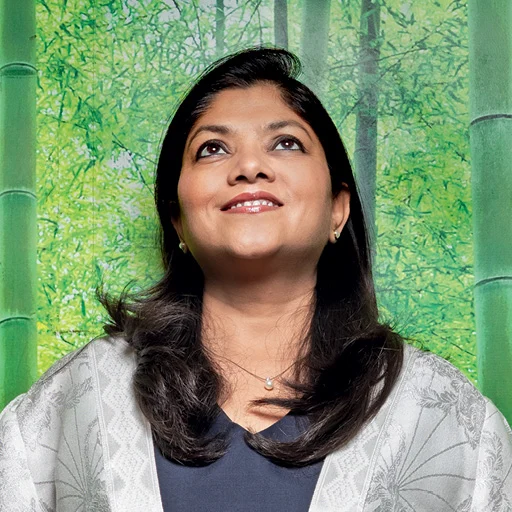The invisible climate warriors: How India's women are solving the crisis nobody sees
Women across India are leading the fight against climate change. Yet their contributions remain largely invisible in the mainstream climate conversation.

This story belongs to the Fortune India Magazine April 2025 issue.
GREEN WORMS, a waste management startup specialises in managing waste in rural Kerala. It has till date collected and recycled 100,000 tonnes of plastic waste from villages in the southern state and has also spread its wings to rural Tamil Nadu and the Andaman & Nicobar Islands. What makes Green Worms unique is its 5,000-strong women waste entrepreneurs who collect, segregate, and recycle waste every day. They earn anywhere between ₹500 and ₹600 per day, in contrast to the meagre ₹220 they would get if they were a part of some government employment scheme for women. It helps them support their families and take care of their children’s education.
Founder and CEO, Jabir Karat, says building a business with women at the core was an obvious choice. “We work with women not because we want to do them a favour but because they are ideal for the job — they understand the pain of a household having waste, so they are empathetic. Moreover, this is a regular job and we need a workforce that is patient, systematic, and diligent. Women score higher than men across all these parameters.”
Karat isn’t the only climate entrepreneur who sees merit in building a women-centric business. Research suggests that women and businesses that solve climate change issues go hand in hand. The reason: women across the globe are the worst victims of climate disasters and hence considered to be more sensitive towards solving them. In fact, women make up 80% of the population displaced by climate and biodiversity loss, while environmental degradation limits availability of land and resources. Be it heat waves, floods or earthquakes, women are always the worst impacted.
According to a report by Women Entrepreneurs Finance Initiative (We-Fi), women entrepreneurs are more likely to start sustainability focussed businesses, and are also willing to disrupt and innovate. Women entrepreneurs, says the report, play an important role in driving innovations and business solutions to address challenges faced by climate change. They are also better positioned to help accelerate the adoption of novel climate solutions. Be it convincing families to embrace renewable energy (RE) solutions, or climate-friendly agriculture practices, women are always ahead of the curve.
The climate change narrative is gathering steam across sectors. According to a Nadhi-ClimateHires report on women and climate careers, India is becoming a leader in green growth, with the potential to unlock $1 trillion in value by 2030 and create 35 million green jobs by 2047. Key sectors driving this growth include RE, waste management, electric vehicles, sustainable textiles and green construction, especially in urban areas. Over 138 Indian companies have committed to achieving net-zero emissions by 2050, and automotive, construction, and textile sectors are at the forefront of this transition. The EV sector alone is expected to create 10 million direct and 50 million indirect jobs by 2030, offering opportunities to upskill the existing 35 million internal combustion engine (ICE) workers. Sustainable textiles can support transitions for 45 million textile workers, while 11 million construction jobs could be affected by sustainability shifts by 2030.
However, as far as hiring through the gender lens is concerned, India has significant ground to cover. The Nadhi-ClimateHires report reflects a persistent gender gap in the green workforce. Currently, only 10% of women possess at least one green skill, compared to 17% men. The growth in women entering the green workforce is three times slower. The good news, however, is that Indian companies solving climate challenges are recognising the importance of having women in the workforce. ITC, ReNew, Ola Electric and climate startups such as Frontier Markets are leading the narrative. But for most of these organisations, while solving climate challenges was a priority, hiring through the gender lens was an afterthought!
When Ajaita Shah, founder and CEO, Frontier Markets, launched her social commerce platform in 2013, the intent was not to solve climate-change challenges, but to build an e-commerce platform for rural consumers. Shah chose to work with women in the villages of Rajasthan. She created an all-women sales force (sahelis) who went door-to-door selling myriad services, ranging from agriculture and clean energy solutions to financial products and home appliances. She preferred women not because they were more dependable, but because they had easy access to people’s homes. Though men controlled the purse strings, it was the woman of the house who had the final say when it came to investing in a solar cookstove or a washing machine. Shah quickly realised it would be far easier for a woman salesperson to convince the customer, who is often a woman. As the sahelis made their way into consumers’ homes in rural Rajasthan, they also started selling other forms of clean energy solutions, environment-friendly agrarian practices, and even insurance products.
More Stories from this Issue
As Frontier Markets touched upon the lives of over 3.5 million customers across 5,000 villages in three states (Rajasthan, Uttar Pradesh and Andhra Pradesh), Shah began to understand the nexus between women and climate change. Every single household her sahelis worked with was into agriculture. Also, over 51% of farmers in India are women. They spend longer hours on fields and do most of the work involving drudgery. Whenever there is a climate disruption (heat wave, floods or drought), women farmers are hit the hardest.
“We have been able to partner with a lot of different agritech financial service providers and other companies and bring in climate-friendly solutions to address risk mitigation and adaptation. We have to remember that 51% of farmers in India are women, and at the end of the day when you bring in women (the sahelis also come from agrarian families) to understand the needs of women, you can bring in a much stronger gender lens and then design and innovate very differently,” explains Shah.
The social commerce platform recently partnered with Global Parametrics to design a climate insurance product for small women farmers in India. “There are different ways of looking at climate and gender. One, by helping women farmers get access to better advisory and services that can help cultivate their land more effectively. By helping them embrace efficient farming practices, we are enabling them to become climate champions since they are able to reduce carbon emissions. By helping with better cultivation processes and designing of better financial products, we are making farmers more resilient to climate calamities. So, it’s a business at the end of the day,” Shah explains.
Good for business
(INR CR)
The RE market is expected to cross $2 trillion by 2030. It has generated over 13.7 million jobs globally till date. Solar is the fastest-growing subsector, employing more than a third of the current global RE workforce. Though the energy sector is among the least gender-diverse, studies suggest women-led businesses in energy supply chains tend to perform as well or even better compared to their male counterparts in most cases.
The representation of women in India’s RE sector in quite low. With 15% women constituting its workforce, renewable power company ReNew is way above the overall industry average of high single-digits. The founders believe a gender-balanced workforce is good for business.
According to Vaishali Nigam Sinha, co-founder, ReNew & chairperson, sustainability, it is imperative to have women on sites as well as in the salesforce in remote areas, since they are the worst hit by climate change, especially extreme conditions and drought.
“Women who have experienced climate change-related issues are the ones who will be able to convincingly sell a product that solves the problem. Clean energy also helps in reducing emissions. So, getting them into this whole distributor network for selling solar panels is a great way to drive consumption. Besides, including women in the workforce also solves unemployment issues in rural and semi-rural areas,” explains Sinha.
ReNew has been investing in training rural women to become solar technicians at its sites in the Rann of Kutch and Bihar. These women are typically daily wage workers in salt pans and coal mines. Sinha claims their earnings have improved. “As salt pan workers, they were earning about $100 a year. It was because they only worked for six-seven months in a year, after which they had nothing much to do in the village. Today, as solar technicians, they are making $100 a month.” The firm operates two all-women solar power sites, but with an ambition to have a 40% diversity rate by 2030, the plan is to have more women at the front-end.
Solving climate problems requires a behaviour change, says Tanya Singhal, founder, SolarArise and Mynzo Carbon. “You can’t ignore 50% of the population when you’re trying to create a behavioural change. You need to have both gender perspectives in a business than just one. If you’re building something that impacts women at the grassroots, whether it’s about cookstoves or agriculture, you have to employ more women.”
“We need to redesign systems to invest in their leadership,” asserts Seema Bhatia Panthaki, director, Gender Equality Platform, AVPN. “Women’s on-the-ground experience and practical knowledge are vital for climate solutions... The question isn’t ‘bringing’ women into climate action; they’re already leading it, driving sustainable agriculture, resource management, and household resilience. What is needed is prioritising asset ownership, especially land rights. This empowers women with real voice and control.”
The narrative that women-led workforces are good for climate as well as for business holds true in the world of specialty coffee, too. In the Araku Valley in Andhra Pradesh, the Naandi Foundation, which owns specialty coffee brand Araku, has ensured women play the lead in its coffee farming narrative. When the Naandi Foundation went to explore setting up coffee plantations in the valley more than 30 years ago, the farmers earned a living by cutting trees to sell firewood. They grew ragi on small patches of land for their own consumption and their existence was hand-to-mouth.
“More than coffee, our main objective was to make farmers profitable using regenerative agriculture, and at the same time show that the earth is ecologically sustainable. Agriculture is long-term and you need to have an ideology and philosophy that is self-sustaining. We realised early on that cultures are best retained by women. For us it was as a strategy to keep women at the forefront of embracing a sustainable culture,” says Manoj Kumar, CEO, Naandi Foundation.
But convincing women to lead is not easy in a patriarchal society. Kumar decided to approach it as a family farming initiative, led by the woman. “We said men and women need to be equally involved in our farms. The interventions we introduced were long-term. We were talking of building estates and planting trees. It was the women who valued it more and were leading the initiatives. They were also playing a role in getting their children involved in it. So, the idea of women-led agriculture in Araku came from the fact that we wanted the culture of sustainable agriculture to be introduced, nourished, entrenched, and kept alive.”
Decades later, not only has Araku Coffee made its mark in the global specialty coffee market, the Araku Valley has a thick forest cover and the plantations are completely rain-fed. The coffee plantations also harvest a host of other crops such as turmeric, pepper, and rajma. The average income of the farmers has gone up from ₹10,000 per year to ₹1-3 lakh.
“When women are given a platform, they not only uplift themselves but also become key drivers of environmental conservation and gender equality,” says Purnima Devi, environmentalist and wildlife biologist from Assam. She is the only Indian woman to feature in TIME’s Women of the Year 2025 list for her contributions to conservation. “By integrating their voices into climate policies and strengthening their leadership, we can build a resilient climate community powered by rural women.”
Funding mismatch
Dhanpal Jhaveri, CEO, Eversource Capital and vice chairman, Everstone Group, believes diversity in leadership drives better business outcomes and greater impact. “While our investment strategy is sector-focussed rather than gender-specific, we actively seek out businesses that are solving climate challenges with innovative and scalable solutions. Women entrepreneurs bring a unique perspective to problem-solving and supporting them is not just about equity — it’s about unlocking untapped potential in climate innovation.”
He cites the example of portfolio company Ecofy, a green finance solutions company co-founded by Rajashree Nambiar. “Ecofy tackles one of the biggest barriers to climate action — access to finance. By focussing exclusively on green lending, Ecofy is empowering businesses and individuals to transition to a low-carbon economy. Its innovative approach, execution strength, and scalable vision have positioned it as a key enabler in sectors such as EV adoption, rooftop solar, and energy efficiency. By supporting high-impact businesses like this, we aim to accelerate climate action while fostering a more inclusive investment landscape,” Jhaveri adds.
“Digital financial platforms tailored for green financing are helping scale climate-smart solutions by facilitating better access to credit and financial tools,” shares Rajashree Nambiar, co-founder, MD and CEO, Ecof. Ecofy Finance has built one of its kind, tech-first, green-only NBFC. They are a digital lending platform offering loans to retail consumers in the space of electric vehicles, roof-top solar panels and green equipment financing. “With our unique perspective, we partner with people and businesses who want to reduce their carbon footprint and restore balance to the planet,” she adds.
India’s climate-tech space is witnessing a surge in women-led ventures, with 39% startups in the sector being female-founded. But access to finance remains a key hurdle. Despite this growth, women receive only 7% of venture capital funding compared to male-led startups. “Women innovate in clean energy, sustainable agriculture, and circular economy solutions, but they struggle to secure funding due to biases in investment frameworks,” says Angela Chaudhuri, chief catalyst at Swasti, a public health platform.
“When women gain access to credit, they can invest in initiatives that not only help communities adapt to environmental stress, but also reduce household energy costs and create income-generating opportunities,” says Naghma Mulla, CEO, EdelGive Foundation. For too long, women’s contributions to climate action have been undervalued. Their leadership in adaptation and resilience needs to be recognised, funded, and integrated into climate policy. A 2021 UN report found that women’s leadership in climate programmes increases project effectiveness by 35%. “Traditional financial systems have long excluded women, making it harder for them to secure credit, land, or resources,” says Mulla. “Expanding gender-responsive climate finance in India could unlock greater innovation and impact.”
As the world races towards a climate-resilient future, countries that fail to integrate women into their climate policies will find themselves fighting an uphill battle. Women-led businesses are driving meaningful change — like GreenGrahi, which turns food waste into sustainable farming inputs, or BharatAgri, an AI-powered platform offering climate-smart farming advice. Then there’s Swayam Shikshan Prayog, which has trained 80,000 women in climate-resilient agriculture, helping boost farmer incomes by 30%.
“Financial inclusion not only boosts women’s self-confidence but also gives them a voice in decision-making processes related to climate initiatives,” says Anvesha Thakker, co-lead, energy transition, global decarbonisation hub, and partner, KPMG in India.
“When combined with capacity building or training programmes, it can create deep-rooted transformation, enabling women to lead and benefit from climate solutions,” she adds.
For India’s climate future, ensuring women’s full participation is no longer a choice — it’s imperative. The silent climate warriors must now take centre-stage in shaping a more resilient and sustainable world.

